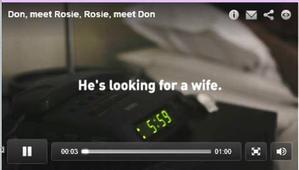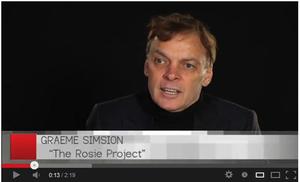
|
|
| photo: James Penlidis | |
Graeme Simsion, Ph.D., is a New Zealand-born Australian author, screenwriter, playwright and data modeller. He was the owner of a successful consulting business who decided, at 50, that he would become a writer. The Rosie Project is his first book. Simsion is now a full-time novelist. He is married to a psychologist/erotic fiction writer and once gave a conference presentation dressed as a duck.
How does it feel to have gotten so much interest in your first novel?
After winning the Victorian Premier's Prize for an Unpublished Manuscript in June of 2012, I had strong interest from local (Australian) publishers and found myself managing a bidding process--I don't have an agent. It concluded with an agreement with Text Publishing, an outstanding publisher in my home town of Melbourne. The advance was nice to have, but not an amount that was life-changing. I still needed to keep my "day job" of running seminars on data modeling (database specification) and consulting skills.
Then, in September, Text took the manuscript to international publishers and everything changed. In two weeks, I had deals with a dozen publishers, including the bigger countries: the U.S., the U.K., Germany, Canada, France, Italy, Brazil and offers from another 10 or more. This time the financial amounts were at a different level, and I made a decision to give up my day job and become a full-time writer. Currently we've sold to 35 countries, with three more in play right now.
But you asked how I felt. Gobsmacked, at the interest. Unburdened, to be quitting the day job that I enjoyed but had been doing a long time. Excited, that I would have time to realize whatever potential I had a writer.
Don has many traits that are characteristic of Asperger's Syndrome. Was his character development informed by research into that condition, or do you know a real-life version of Don?
I worked in information technology for over 30 years. During that time I also did teaching and research at several universities. So I met many people who were, in one way or many, a lot like Don. Go to the mathematics department of any university and you'll find Don's kin. He's only unusual to people who don't work in science and technology!
I did some research on Asperger's Syndrome only after I had developed Don's character, and it did not influence that character. In fact, its main use has been in supporting an answer to the question "Does Don have Asperger's?" I'm not a psychologist, but I'd guess that most psychologists would answer "yes."

I made a deliberate (and important) decision not to describe Don as having Asperger's Syndrome. When I first brought Don, as a character in a short story, to a workshop, and described him as a man with Asperger's Syndrome, everyone focused on the syndrome rather than the character. I got comments in the form of, "But people with Asperger's don't drink/do martial arts/wear socks." I really understood the plea to "see the person, not the disability." Even now, people will say to me, "You've got him wrong... people with Asperger's would rather continue their routine life than find a relationship," and my response is, "If that's true of all people with Asperger's, then Don doesn't have Asperger's."
More broadly, it does bother me that some readers want to make Don a representative of all people with autism/Asperger's. I think there's room in this world for many different heroes (and villains) with Asperger's--it's not about who has nailed "it" best.
Finally, many reviewers have commented on the fact that Don does not realize he has Asperger's syndrome--and regard it as the least believable part of the story. On the contrary, Asperger's has historically been diagnosed in children rather than adults, and was not a common diagnosis until the 1990s. My wife, a professor of psychiatry, confirms that if Don had presented with psychiatric problems as an adult, it's unlikely that Asperger's would be on the "differential diagnosis" list.
Also, Don might choose not to be put in a box. Amongst adult "Dons" that I know, virtually none acknowledge having Asperger's, though I think this is changing with greater awareness and acceptance.

How did you balance using Don's quirks to create humor with respecting him and not taking away from his romantic appeal?
I was very concerned not to make fun of people who were different--at least not in a way that added difficulties to what might already be a difficult life for them. My argument was essentially that Don is different, not disabled, and that his story is a "fish out of water" one--a stranger in a strange land. Crocodile Dundee in Los Angeles. In these stories we laugh both at the protagonist for his ignorance of the local customs, and with him when he shows up the flaws in those customs or uses his own background to cut through them ("this is a knife.") It's a balancing act.
And Don is a hero. Like all good heroes, he has to overcome not only external challenges, but his own weaknesses--one of which is his lack of social skills. We relate to him, because all of us have made a social faux pas, or messed up a date. As for the romantic appeal, he's competent, fit, intelligent, in stable employment, good looking (at least to Rosie), honest and persistent. Not a bad start!
There's interest in turning The Rosie Project into a film, and the book certainly pays homage to the rom-com film genre. What are some romantic movies that you love or that inspire you?
Sony Pictures (Columbia) optioned the film rights, including the screenplay on which the book is based (also written by me) in April 2013. I was inspired more by the old screwball comedies, the precursors to the modern rom-com, than recent movies: Bringing up Baby, His Girl Friday, The Philadelphia Story, The Apartment.... In modern rom-coms, I'm a fan of Hitch, It's Complicated, Groundhog Day and, to throw in a couple of less-fêted movies, Eagle vs Shark and Run, Fatboy, Run. I love the modern French farces--The Dinner Game, The Closet, The Visitors, Heartbreaker.
Reading a romantic comedy that's written by a man and narrated from the male perspective isn't an everyday occurrence. Did you write it with an aim toward cross-gender appeal?
I wrote it to tell a story that I thought everyone could relate to. I think most of us have a bit of Don in us or know someone who has. I never thought of it as a story for women, and, indeed, in its original form as a screenplay, I saw it as a "date movie." It's only when publishers get involved and tell you that most fiction is bought by women....
What can we expect from you in future?
I have a three-book contract with Text Publishing, and have drafted two more books, both "mature age" love stories. But I've put both aside to work on a sequel to The Rosie Project. And of course I'm working on the screenplay for the movie--having come full circle from writing the story originally as a script. --Jaclyn Fulwood

